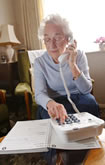A report published by the Institute for Fiscal Studies (IFS) has uncovered a worrying statistic: all pensioner households increased spending on central heating by seven per cent during recent cold snaps, but the poorest quarter of retired households also happened to reduce spending on food by the same proportion.

The IFS report ought to sound alarm bells ahead of the forthcoming winter, as Britain’s leading energy suppliers are expected to raise energy prices in the next few weeks and months; in fact, the IFS paper was published just a day after Scottish Power announced its decision to increase prices yet again.
Scottish Power plans to increase gas bills by 19 per cent and electricity prices by 10 per cent effective 1st August – around 2.4 millions customers in the UK will be affected. Other utility companies are expected to follow suit, leaving millions of homes across the country in a potentially difficult condition.
Will more pensioner households be required to spend less on food – the cost of which is also expected to rise – than fuel this winter? The answer is probably in the affirmative, but a separate report published by the IFS suggests existing measures to help pensioners cope during cold snaps are having the desired effect.
According to the IFS, retired households spent an average of 41 per cent of their winter fuel payment on energy bills for the home. The IFS also discovered that most pensioners would only increase fuel bill spending by £3 if their income is increased by £100 – but that figure would be almost fourteen times higher if the increase is branded a winter fuel payment.
In other words, pensioners tend to spend allowances and top-up payments as intended.
Senior Research Economist at the IFS, Laura Blow, said: “The winter fuel payment was introduced to encourage older households to spend more on heating in the winter. Remarkably it appears to have had just that effect. The fact that it is labelled a winter fuel payment appears to mean that much more of it is spent on fuel than would have been the case had no such label been attached”.


